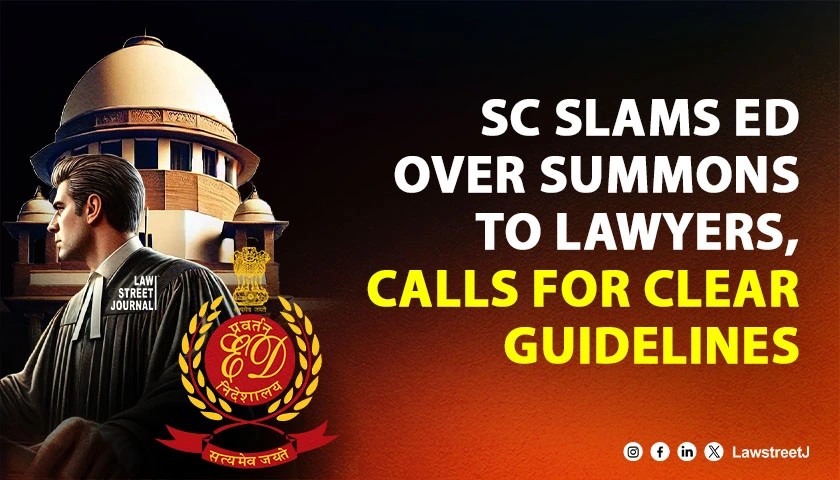NEW DELHI: The Supreme Court on Monday favoured framing guidelines as it expressed anguish over the Enforcement Directorate issuing summons for senior advocates for offering legal advice during investigations, saying the central agency is "crossing all limits".
In a suo motu case, a bench of Chief Justice of India B R Gavai and Justice K Vinod Chandran deprecated that in so many matters, where the High Court had passed well-reasoned orders, the ED is filing appeals after appeals only for the sake of filing them.
Recently, the ED summoned senior advocates Arvind Datar and Pratap Venugopal in a development which came under severe criticism by lawyers bodies.
Considering the matter, the court highlighted, "The communication between a lawyer and the clients is privileged communication, and how can the notices be issued against them. They are crossing all limits.”
One counsel contended that recent ED notices to legal professionals like Datar could have a chilling effect on the practice of law.
The bench said guidelines should be framed, in this regard.
Solicitor General Tushar Mehta said there have been attempts to malign institutions by creating false narratives.
Attorney General R Venkataramani, along with Mehta said with regard to summons to the lawyers, the matter was taken up at the highest level, and the probe agency was asked not to issue notices to the lawyers for rendering legal advice.
Mehta said, however, submitted, "For example, if I am a politician, I am involved in a Rs 3000 crore scam. I can create a narrative in my favour by several interviews etc.”
“We know the ground realities,” the bench said.
Mehta said that ground reality should be seen from the facts presented and material and evidence available, and stressed, "sometimes wider observations create the wrong impression…".
"We are not passing any compliments," the bench observed.
Mehta said, the court may neither compliment nor criticise, it should be based on facts.
On this, the bench said, "We don’t watch the news, haven’t seen YouTube interviews."
"Only last week I managed to watch a few movies,” the CJI said as he was indisposed.
Mehta suggested the court may law down the guidelines.
Other counsel contended that summoning lawyers, especially for giving legal opinions, was setting a dangerous precedent.
Mehta argued can a lawyer, while representing a client, "Build a narrative outside the court, in political matters and it is a question of law and I am not on ED”.
The bench said it is not influenced by any narrative.
"Have you seen any judgment authored by us that has been based on narrative and not on the facts of the case," the bench asked Mehta, who said a lawyer cannot be summoned for giving a legal opinion, and contended that he is not adversarial in the matter.
When Mehta referred to politicians, accused in scams, attempting to shape public opinion, the bench said, "We said it in other matters, don't politicise this."
The bench decided to consider the matter for further hearing on July 29.
In June, 2025, the ED issued summons against senior advocates Datar and Venugopal under Section 50 of the Prevention of Money Laundering Act, 2002 in its investigation into the Employee Stock Option Plan (ESOP) granted by M/s Care Health Insurance Ltd for purported legal opinions rendered by them supporting the grant of Stock Options to former Religare Enterprises Chairperson, Rashmi Saluja.
The summons were subsequently withdrawn.
Dealing with a separate matter on June 25, the Supreme Court's bench of Justices K V Viswanathan and N Kotiswar Singh had said permitting either the police or probe agencies to directly summon lawyers for advising clients would undermine the autonomy of the legal profession.
The court emphasised that the legal profession was an integral component of the process of administration of justice.
"Permitting the investigating agencies/police to directly summon defence counsel or advocates who advise parties in a given case would seriously undermine the autonomy of the legal profession and would even constitute a direct threat to the independence of the administration of justice," the court had then said.

















